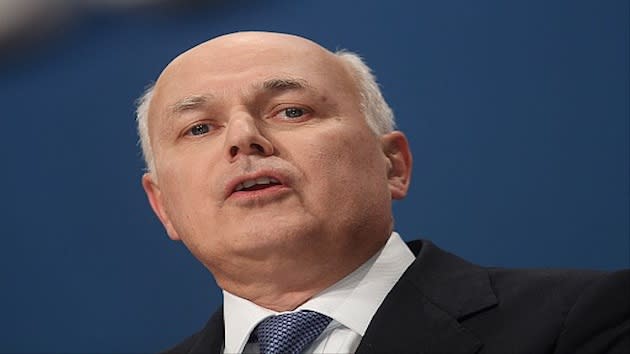IDS loses legal challenge to keep Universal Credit problems secret

By Natalie Bloomer
Iain Duncan Smith has lost his latest attempt to keep potentially damning Universal Credit documents secret.
If this sounds a little familiar, it’s because this isn’t the first time the department has been ordered to publish these papers. In fact, it’s now the third.
In 2012, Tony Collins and John Slater separately fired off Freedom of Information (FOI) requests for several reports relating to the early stages of Universal Credit. The documents detail any problems Department of Work and Pensions (DWP) staff imagined could arise from the programme, information about issues which did occur, and the outcome of a high-level review. Their requests were flatly refused.
The pair complained to the Information Commissioner who decided that all but one of the reports should be published. The DWP then started what has become a lengthy and costly legal battle to keep them hidden. Four years on from when the FOI requests were first sent in, a second judge has now demanded that all the papers are released.
So just what does IDS have to hide? We can only guess but there is a good chance the reports will reveal his department were misleading the public about the progress of the programme. To find out a bit more it’s worth looking back to what was happening around the time the FOI requests were being dealt with.
In November 2011 the DWP issued a press release announcing that over one million people would be claiming universal credit by April 2014, with 12 million claimants moving onto the new benefit by 2017.
The following year, the DWP’s Annual Report and Accounts showed that the programme had progressed well. Then in September of that year, the BBC carried astory on concerns raised by the Local Government Association about the implementation of Universal Credit and in particular about the IT system. A spokesperson for the DWP responded at the time by saying: “Universal Credit is on track and on budget. To suggest anything else is incorrect.”
This information is highlighted by Judge Ryan in his final decision, and for good reason. We know now, of course, that the statements coming out of the DWP back then told quite a different story to what actually happened with the programme. Their ownfigures show that at the last count just little more than 200,000 people are now on the new benefit and recent estimates suggest it’s unlikely to be fully implemented until 2021, some four years later than first planned.
So perhaps it’s not surprising that IDS is desperate to keep the papers out of the public domain. His legal argument is that publication of the documents would have a “chilling effect” on the working of the department. This term may sound like some sort of threat to national security but it’s actually a fairly standard defence against disclosure. Witnesses for the DWP argued that if staff knew that everything they wrote internally was likely to be made public they would be less candid and forthcoming in their opinions. The department also claimed that publication of the documents could allow a hostile press to pick and choose sections of the information to cause the most damage to the department, without providing a full picture. The Tribunal didn’t agree. In his final decision, Judge Ryan said:
“We are not convinced that reasonably robust civil servants would consider that the risk of disclosure in those circumstances would create pressure to change the way in which they operated.”
And on the issue of media coverage he said:
“It is, in any event, a perfectly appropriate performance of the media’s role in a modern democracy for it to investigate and comment on the implementation of a major reform involving large sums of public money and a potentially crucial impact on the lives of some of the least fortunate members of society.
"We do not therefore accept the Department’s submissions on the likelihood of the public misunderstanding the disputed information, or being misled as to its significance by the media. On the facts of this case disclosure might have corrected a false impression, derived from official government statements by revealing the very considerable difficulties that were beginning to develop around the time when the information requests were submitted.”
And that’s the crux of the matter. The information requested by Collins and Slater could have led to the public having a much a clearer idea of the problems around Universal Credit, long before the DWP finally made them public.
Speaking to Politics.co.uk after the ruling, Collins said he believed disclosure of the papers would have undermined the information coming out of the DWP at the time: “It’s frightening that government departments can spend hundreds of millions of pounds on IT projects such as Universal Credit with the true facts staying hidden for years, because these internal assessment reports are always kept confidential”
Slater says he first requested the documents because the timescales given by the DWP on Universal Credit were laughable. Although he is happy with the tribunal’s latest ruling he believes there is every chance IDS will appeal the decision once again.
The DWP say they are carefully considering the Tribunal’s decision. A spokesperson said:
“Universal Credit is rolling out successfully and is available in 95% of jobcentres with over 32,000 people making a claim to it last month.”
Whether they decide to appeal again remains to be seen. One thing is for certain though, the more IDS fights publication, the more it looks as if he has something to hide.

 Yahoo News
Yahoo News 
